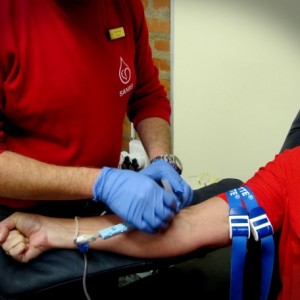 WASHINGTON — The U.S. Food and Drug Administration (FDA) has issued its final guidance on allowing homosexual men to donate blood, stating that men should be allowed to do so if they have been abstinent for at least one year.
WASHINGTON — The U.S. Food and Drug Administration (FDA) has issued its final guidance on allowing homosexual men to donate blood, stating that men should be allowed to do so if they have been abstinent for at least one year.
As previously reported, the FDA first announced its intent to loosen its restrictions on blood donations from homosexual men last year, stating that it would “take the necessary steps to recommend a change to the blood donor deferral period for men who have sex with men from indefinite deferral to one year since the last sexual contact.”
The administration said that it compared its policies with current scientific evidence surrounding HIV transmission, as well policy changes implemented by other countries, before making its final guidance announcement on Monday.
“In reviewing our policies to help reduce the risk of HIV transmission through blood products, we rigorously examined several alternative options, including individual risk assessment,” explained Peter Marks, M.D., Ph.D., deputy director of the FDA’s Center for Biologics Evaluation and Research, in a statement.
“Ultimately, the 12-month deferral window is supported by the best available scientific evidence, at this point in time, relevant to the U.S. population,” he continued. “We will continue to actively conduct research in this area and further revise our policies as new data emerge.”
The FDA noted that the UK and Australia both have a one-year deferral period.
The administration first enacted its policy in 1983 during the height of the AIDS crisis, but some have decried the ban as being discriminatory toward homosexuals. The National Gay Blood Drive released a statement on its website this week that while it is “pleased to see the FDA has issued the final guidance” on homosexual blood donation, it still finds the rules tantamount to discrimination.
“While gay and bisexual men will be eligible to donate their blood and help save lives under this 12 month deferral, countless more will continue to be banned solely on the basis of their sexual orientation and without medical or scientific reasoning,” it wrote.
The group wants homosexuality removed as a stigma surrounding blood donation.
“So today we begin the final push to eliminate discrimination based on sexual orientation from the blood donation process altogether. We strongly encourage the FDA to move toward a deferral based upon individual risk assessment,” it said.
But others state that they are concerned that the FDA has loosened its restrictions at all.
“There are several highly disturbing aspects to this politically-motivated change in the United States’ blood donation policy,” Peter LaBarbera, president Americans for Truth About Homosexuality, told reporters. “First of all, homosexual activists frame this entire issue in terms of so-called ‘anti-gay discrimination’ and equality, instead of prioritizing above all the safety of the American blood supply.”
“Secondly,” the FDA’s report shows that a small percentage of homosexual men have ignored the blood donation ban,” he continued. “Now we are going to trust practicing homosexuals with an even looser regulation?”
“Thirdly, the FDA report shows that the new standards are more lax than Australia’s policy—which threatens violators with prosecution if they are found to have lied about their behavior in making their blood donation—even though Australia was cited as the model for the U.S. making the change,” LaBarbera said.
Heterosexuals who are involved in prostitution, those who have had sex with a prostitute, or those involved in illicit drug activity are also included in the ban.
Become a Christian News Network Supporter...


